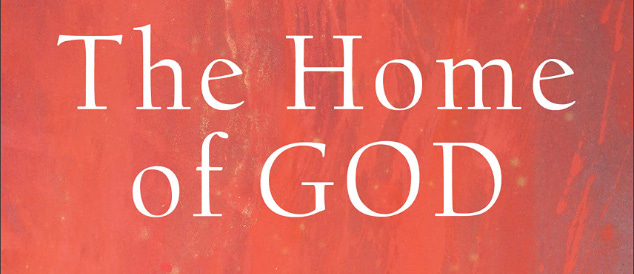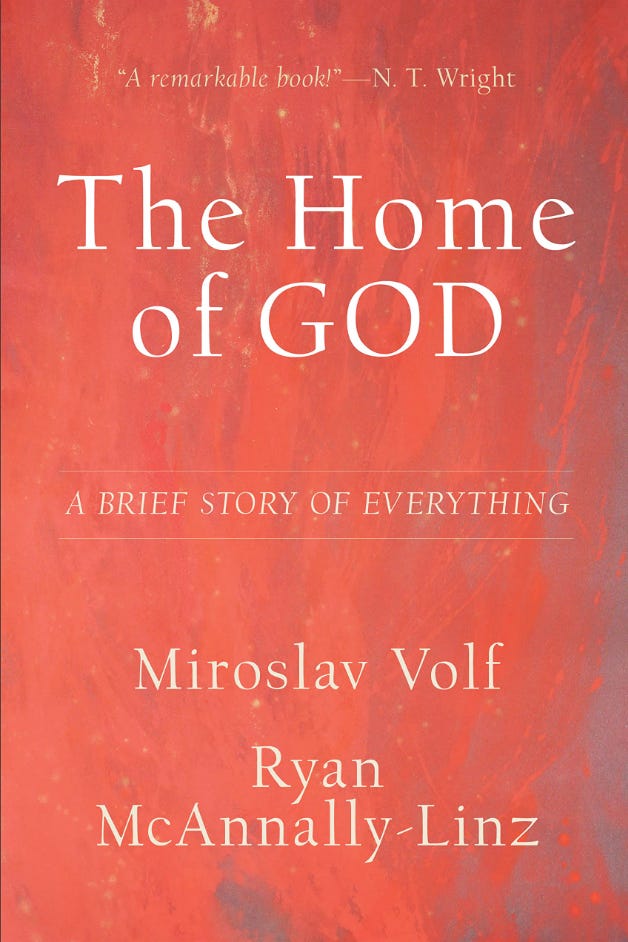Faith Makes us at Home with God
By way of reminder, as I have gotten behind on posting about this book, this should catch us/you up. A new book by Miroslav Volf and Ryan McAnnally-Linz (VM-L), The Home of God: A Brief Story of Everything, presents a “systematic biblical theology” in a new key. As such it will not be perceived by some for what it actually is. It is a new kind of theology that takes the Bible’s massive narrative, what is called the “story of everything” and sorts theology through the narrative. I wrote a little about this in Five Things Biblical Scholars Wish Theologians Knew, and of course they “know” this but a theology that is shaped by topics does not in fact “know” this.
The north star for the VM-L volume is the word Home. The finality of God’s work in creation is to dwell again with us in this world by making it home. One gets the impression in reading this book that each chapter could become a volume in a comprehensive theology.
God brings us home, but not without faith, so one can say faith brings us home. Faith.
Faith in this book is not shaped entirely by the New Testament but begins with Exodus and its counterpart in the New Testament is the Gospel of John. Faith fits into the polarity at work in GJohn: what is born of flesh is flesh; what is born of Spirit is Spirit (John 1:13). God comes to do something but what God does needs to be received, not in a passive act but in an active reception. Faith involves trust (in Jesus: I believe in) and assent (about Jesus: I believe that), and will, which is the active element of the human in trust, in reception, in assent, and in allegiance. Faith then is “staking one’s existence on Jesus, trusting him not merely for advice or help in one or another matter but for the ultimate foundation for one’s life.” That is, it means “entrusting one’s entire life to Jesus.” The authors (VM-L) look at the royal official of John 4 and Thomas in John 20.
Faith is seeing.
The obstacles to “seeing” include the obvious: God is invisible, uncreated; humans are visible, created. “God does not fit in our perceptual and cognitive apparatus.” Plus, to know this God well one must receive this God’s “tablets of value as the ultimate standard for one’s life.”
Only the Son has seen God/Father because only God can see God (John 1:18). Jesus is “but the manifestation of just that incomprehensible God as incomprehensible ‘in a human form’.” To see Jesus is to see God in the incarnate Son. Accepting Jesus as the revelation of God incarnate revolutionizes what one thinks of God. The GJohn shows that Jesus was not received well, and not even the disciples comprehend who is until later (16:12-14).
Coming to believe.
One is either born of the flesh or born of the Spirit, and one can transfer from the former to the latter by faith. John 12:40 cites a common Synoptic quotation of Isaiah 6 about how people have or have not responded to Jesus. Jesus gives sight and Jesus blinds. Yet, he blinds those who prefer the darkness so that it is not simply predestination. In fact, people are blinded by the light because they see but reject the light. VM-L go Barthian with a formula for comprehending this: “Willingness to embrace the ultimate standard of value Jesus embodies helps a person see Jesus as the manifestation of God, but a person needs to see Jesus as the manifestation of God to embrace him as the ultimate standard of value.”
John is not Hegelian nor is he Kierkegaardian in how either perceives a human’s capacity to believe and see. Here VM-L breach the traditional category of human depravity by contending all humans still harbor light. The creative Word, the Logos, “was and remains the life and light of humanity.” The light shines in those who still hate the light. Hear this:
“The condition for seeing God that the Spirit gives in encounter with Jesus reframes and enhances the life and light already present.”
To come home, to dwell with God who makes us and our world God’s home, entails a faith that is trust, assent, and will.
What is life like in the home, the household of God? (Next Substack.)





